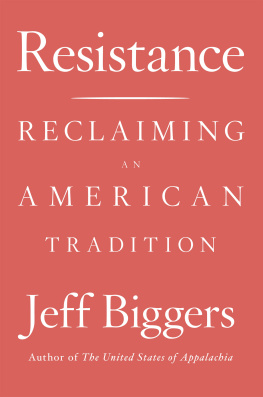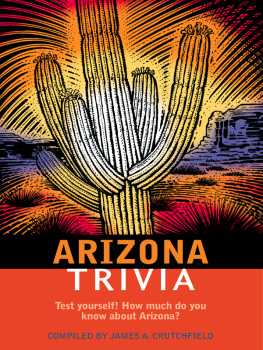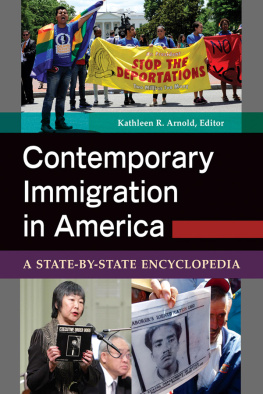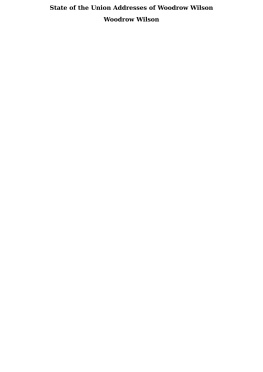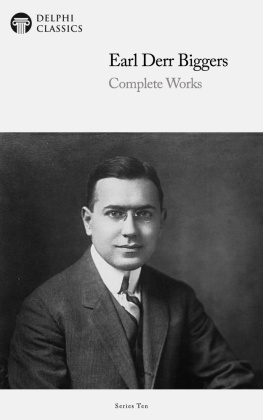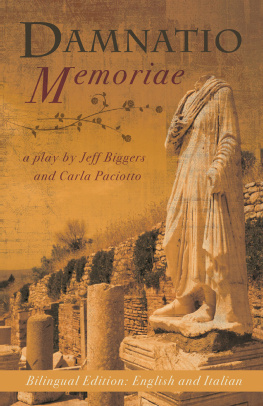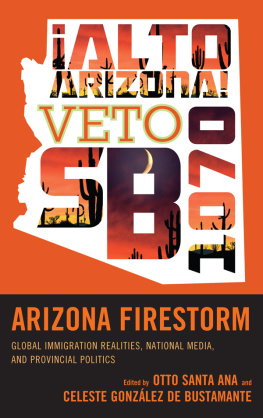State Out of the Union
ALSO BY JEFF BIGGERS
Reckoning at Eagle Creek:
The Secret Legacy of Coal in the Heartland
In the Sierra Madre
The United States of Appalachia:
How Southern Mountaineers Brought Independence,
Culture, and Enlightenment to America
No Lonesome Road: Selected Prose and Poetry of Don West
(co-edited with George Brosi)
STATE OUT OF
THE UNION

ARIZONA AND THE
FINAL SHOWDOWN OVER
THE AMERICAN DREAM

JEFF BIGGERS

Copyright 2012 by Jeff Biggers
Published by Nation Books, A Member of the Perseus Books Group
116 East 16th Street, 8th Floor
New York, NY 10003
Nation Books is a co-publishing venture of the Nation Institute and the Perseus Books Group.
All rights reserved. No part of this book may be reproduced in any manner whatsoever without written permission except in the case of brief quotations embodied in critical articles and reviews. For information, address the Perseus Books Group, 250 West 57th Street, 15th floor, New York, NY 10107.
Books published by Nation Books are available at special discounts for bulk purchases in the United States by corporations, institutions, and other organizations. For more information, please contact the Special Markets Department at the Perseus Books Group, 2300 Chestnut Street, Suite 200, Philadelphia, PA 19103, or call (800) 810-4145, ext. 5000, or e-mail .
Designed by Timm Bryson
Library of Congress Cataloging-in-Publication Data
Biggers, Jeff.
State out of the union : Arizona and the final showdown over the American dream / Jeff Biggers.
p. cm.
Includes bibliographical references and index.
ISBN 978-1-56858-704-2 (e-book) 1. ArizonaPolitics and government. 2. ImmigrantsLegal status, laws, etc.Arizona. I. Title.
JK8216.B54 2012
320.9791dc23
2012025285
10 9 8 7 6 5 4 3 2 1
In memory of Nathan Allen,
Navooch, thvum knei
With rebellion thus sugar-coated, they have been drugging the public mind of their section for more than thirty years; and, until at length, they have brought many good men to a willingness to take up arms against the government the day after some assemblage of men have enacted the farcical pretence of taking their State out of the Union, who could have been brought to no such thing the day before.
This sophism derives muchperhaps the wholeof its currency, from the assumption, that there is some omnipotent, and sacred supremacy, pertaining to a Stateto each State of our Federal Union. Our States have neither more, nor less power, than that reserved to them, in the Union, by the Constitutionno one of them ever having been a State out of the Union.
ABRAHAM LINCOLN, MESSAGE TO CONGRESS, 1861
CONTENTS


Barrio Viejo.
(Photo courtesy of Steve Silverman, Digital Fine Art Creations.)

Are you American, Abuelo?
No, Im not American, I am not Mexican. In fact, I think I am no longer Yaqui. Shit, I cant tell you nothin for real. Im nowhere now.... You see, boy, these people up here around us are so mixed up now that no one belongs, even though this is their country, our country. Do you see?
ALFREDO VA JR., LA MARAVILLA
Ofelia Rivas settled into a chair in a warehouse collective of artists on the outskirts of Barrio Anita in Tucson.
For more than a decade, she had carried stories from her indigenous community on the US-Mexico border in an old van donated by a punk band, in an attempt to get the rest of the country to recognize a steel-tooth partition that had torn apart her people.
In her fifties, Rivas spoke in the unaffected way of many of the Oodham elders who had educated me on the history of the Sonoran Desertand my place in it. Over the past forty-odd years, ever since I first crossed the Arizona border in the backseat of my Dads 60 Chevy, as freckle-faced and hopeful as the other kids along the Sun Belt highway, I had maintained a love-hate affair with a state I still didnt quite understand.
Rivas pressed her long skirt, and then pointed out the window and said we were within walking distance of one of the original water tanks that persuaded a detachment of Spanish soldiers to establish their presidio here in 1775. Oodham and Hohokam ancestors had inhabited the area for thousands of years. The spring in an Oodham village at the base of a west-side volcanic hill, referred to as A Mountain, gave the city its name: Chuk-son, Toixon, Tucson. Like the Hopi villages along the mesas in northern Arizona, the Old Pueblo is arguably one of the oldest continually inhabited settlements on the continent.
Across more than 4,400 square miles in southern Arizona, the Tohono Oodham reservation is nearly as large as the state of Connecticut. Yet only seventy-four miles have mattered to the rest of the world: the line of demarcation between the United States and Mexico. But that line did not define the Oodham or their territory. With the signing of the Gadsden Purchase in 1853, which effectively established todays border on June 30, 1854, an arbitrary line of division ran across the vast Oodham lands, breaking up the tribes centuries-old territories in the process. Not that they were ever consulted or considered.
We didnt cross the border, Rivas began. The border crossed us.
That refrain, now common among Oodham and historic Mexican American families, took me back twenty years. In 1991, after living away for a decade on the East Coast and in Europe, I returned to southern Arizona to do a walkabout and work on an oral history project. Guided by Oodham archaeologist and poet Nathan Allen, I retraced the confines of the prehistoric Hohokam empire in the Sonoran Desert (the northern Mexico state of Sonora and southern Arizona), which had collapsed in the fourteenth and fifteenth centuries. Allens father, who had served as Governor George Hunts chauffeur in the early 1930s, had come from the Tohono Oodham village of Ce:dagi Wahia, or Pozo Verde, which now stood behind a militarized wall on the Mexican side of the border. His mother had come from an Akimel Oodham village near the Gila River, just south of Phoenix.
Beyond any scholarly pretensions, I also saw the project as a way of reconnecting to the Grand Canyon State and learning more of my own history.
Next page

